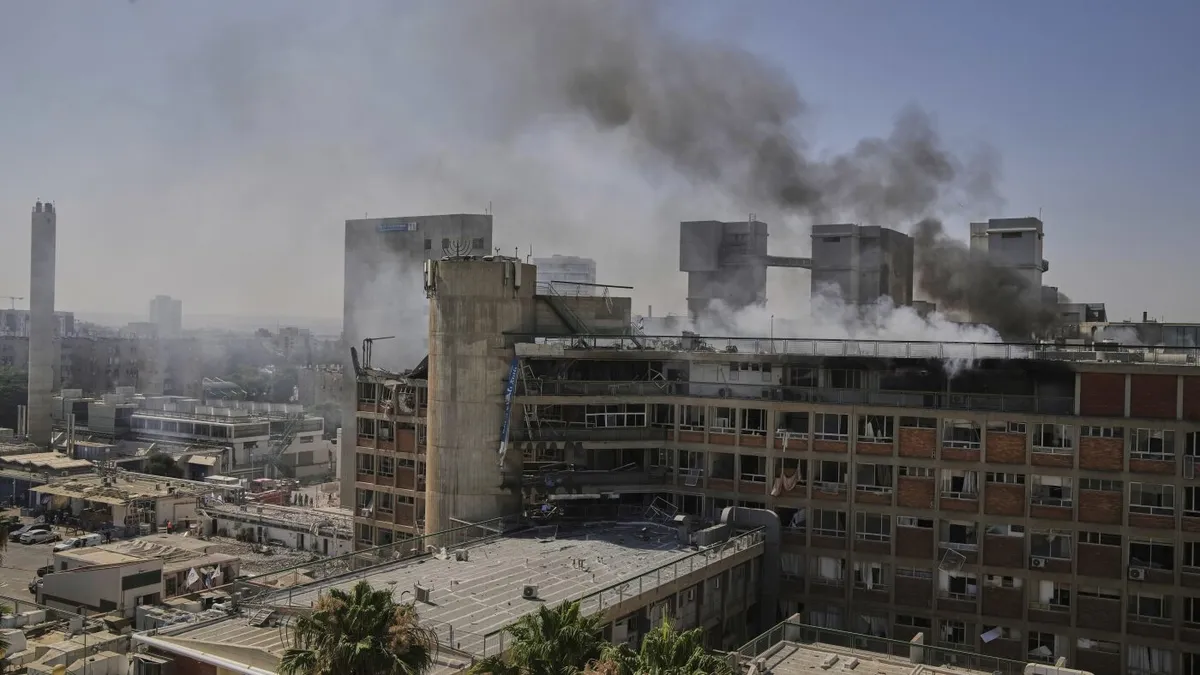
On Thursday, several sites across Israel were hit directly by Iranian missiles, including the Soroka Medical Center, the largest hospital in southern Israel. This attack has prompted sharp warnings from Israeli leaders regarding a potential increase in military operations targeting strategic locations within Iran. According to a statement released by Soroka Medical Center, multiple individuals were treated for minor injuries and cases of shock following the missile strike, which caused significant damage to the hospital's older surgical wing. Fortunately, this section had been evacuated several days prior as a precaution.
Videos circulating on social media depicted the aftermath of the attack, showcasing shattered hospital rooms and thick black smoke rising from the facility. In response to the incident, Iranian state media asserted that the missiles were aimed at a military target nearby, denying any intention to strike the hospital. However, Israeli Prime Minister Benjamin Netanyahu vowed retribution for the attack, emphasizing in a post on X that Iran's “terrorist tyrants” had targeted both the Soroka Hospital in Beersheba and civilian areas in central Israel. He declared, “We will exact the full price from the tyrants in Tehran.”
Israeli Foreign Minister Israel Katz condemned the missile strike, labeling it a war crime and stating that Iran's Supreme Leader, Ayatollah Ali Khamenei, would be held accountable for his actions. In a post on X, Katz criticized Khamenei, describing him as a "cowardly Iranian dictator" who hides in a fortified bunker while launching attacks on hospitals and residential buildings. In addition to the strike on the hospital, other missiles targeted high-rise and residential buildings near Tel Aviv.
Katz and Netanyahu have reportedly instructed the Israeli military to intensify operations against strategic and governmental targets in Tehran as part of a broader strategy to undermine the Iranian regime. Since the onset of the conflict, the Israeli military has reported over 400 rockets and hundreds of drones launched at Israeli territory. As of Wednesday morning, the toll in Israel has risen to 24 dead and 838 injured, with 11 individuals in serious condition.
Israel's emergency services, known as Magen David Adom, reported that three people are currently in serious condition due to Thursday's missile strikes, including an elderly man and two women. Additionally, 42 civilians suffered injuries from shrapnel or explosions, while 18 individuals were hurt while attempting to reach shelters amidst the chaos. On the Iranian side, reports indicate that over 200 people have been killed due to Israeli strikes, according to Iran's Health Ministry. However, the Human Rights Activists News Agency has reported a higher death toll of 639 based on independent sources.
Meanwhile, Israel has persisted with its military operations against Iran, striking the Arak heavy water reactor— a crucial facility within Iran's nuclear program. This action marks the latest step in Israel's ongoing efforts to target Iran's nuclear infrastructure since a surprise attack was launched last week. In a nationally broadcast address, Khamenei warned that any U.S. military intervention in the conflict would result in "irreversible consequences." He affirmed that Iran would resist any imposed war, just as it would oppose an enforced peace.
President Donald Trump refrained from confirming whether the U.S. was moving closer to joining Israel in targeting Iranian nuclear sites, telling reporters, “You don’t seriously think I’m going to answer that question. I may do it. I may not do it. I mean, nobody knows what I’m going to do.” In an interview with NPR, Israel's President, Isaac Herzog, expressed that Israel would welcome any assistance that could help eliminate the Iranian nuclear program completely, but emphasized that decisions regarding U.S. involvement should be left to Trump and his administration.